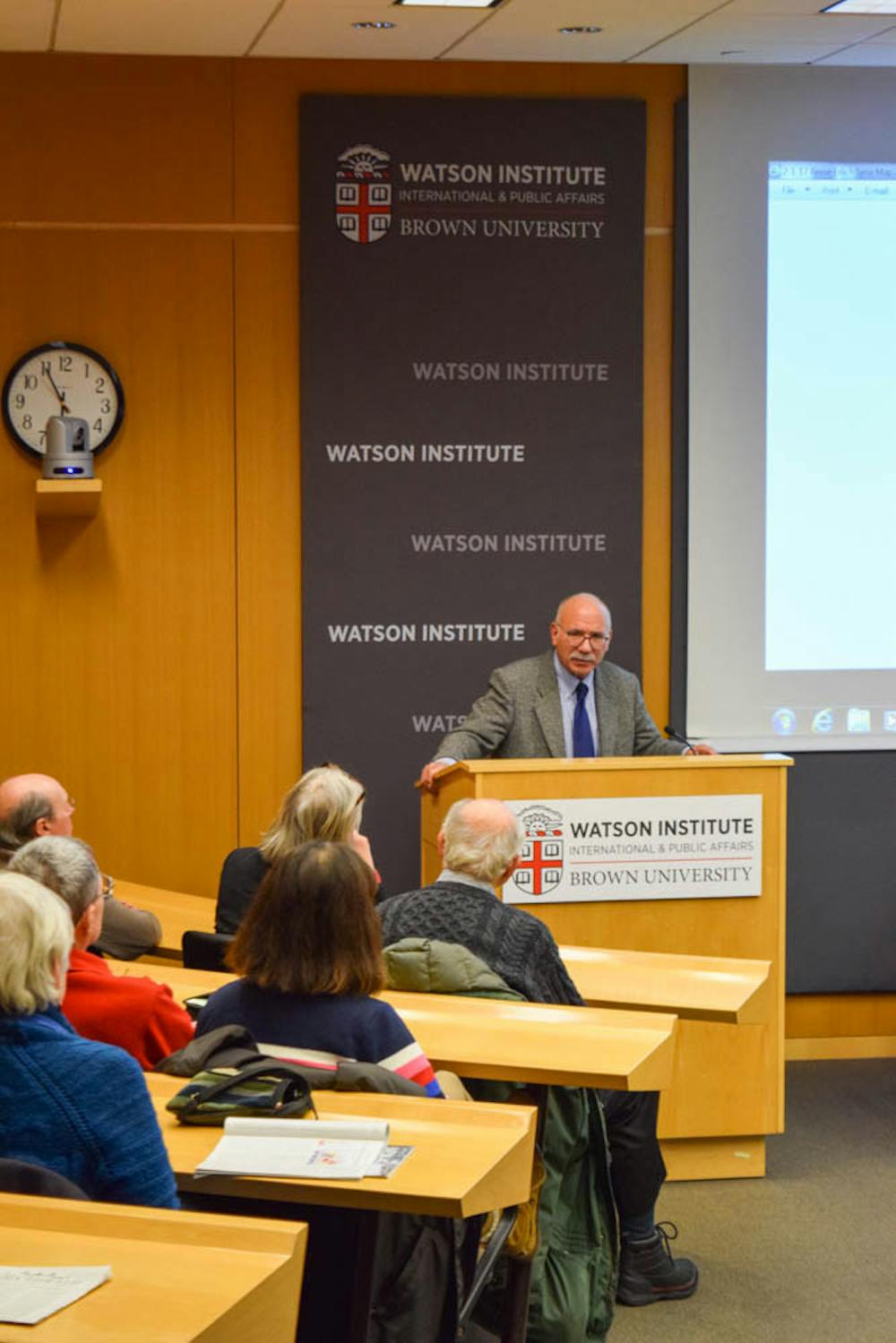In the wake of President Donald Trump’s immigration ban, Reese Erlich — a Peabody Award-winning journalist with over 40 years of freelance experience — spoke at the Watson Institute for International Studies about his on-the-ground experience in the Middle East. In his Wednesday talk, Erlich provided his insights on the Syrian civil war, the failure of U.S. foreign policy and Trump’s challenges ahead.
Erlich had a “very unusual path to journalism.” During his yearlong suspension for organizing “a very big and very successful anti (Vietnam) war” demonstration at University of California at Berkeley in the 1960s, Erlich was hired at the magazine Ramparts, where he worked as a journalist for the first time. He later began freelancing and has reported extensively on countries including Syria, Iran and Iraq.
As a reporter who worked on the ground in the Middle East, Erlich offered refreshing insight into the region in contrast with reporters who rely upon narratives coming out of Washington, said Stephen Kinzer, senior fellow in international and public affairs who reported for the New York Times for over 20 years. Erlich “not only masters the geopolitical complexities, but he (has) the human side of the story,” Kinzer added.
“Life is extremely difficult in Syria,” Erlich told The Herald. “Roughly half the population has been displaced … it’s a war-torn country, and the conditions are very rough” for those fighting in rebel groups and the Assad regime, he said.
Though he supports the United States using diplomatic, economic and political pressure, Erlich told The Herald he has always been against U.S. military intervention in Syria. “The (United States) trying to solve issues with military intervention always results in disaster” just as it did in Afghanistan and Iraq, he said. Syrians are not ignorant of these failures, he added.
While the United States is now spending $12 million a day on the war in Syria, it has supplied less than half of the U.N. dues it pledged to use to help the war-torn country’s refugees, he told The Herald. “If we’re supposedly so concerned about the people of Syria that we need to send in troops, why aren’t we fulfilling our pledges and ensuring that our allies are fulfilling their pledges? It’s part of the hypocrisy of U.S. foreign policy,” Erlich said.
But the U.S. intervention was not motivated by the humanitarian crisis and rather its interest in Syria’s geopolitical position, Erlich said. Syria borders Israel, Lebanon, Turkey, Iraq and Jordan, all countries with their own conflicts. Access to Syria would allow the United States to play a serious role in the region, he said.
“As difficult as it may sound, it’s better to pull out now before a major commitment has been made,” he told The Herald.
But in his talk, Erlich predicted that U.S. military involvement in Syria will increase under Trump given his contradictory campaign promises to defeat ISIS, revoke the Iran nuclear deal and also develop a stronger relationship with Russia, Erlich noted.
While Trump has shown signs of warming up to Russian President Vladimir Putin, he will not be able to negotiate with Russia without dealing with its ally, Iran, Erlich said. The problem: Trump’s appointed “hawks … see Iran as the main enemy in the world.”
“Trump’s policy is a disaster,” Erlich told The Herald. “In the first week and a half, he’s already alienated Mexico, Britain, most of Europe and all of the Muslim world. So I can’t wait to see who he alienates next.”
Trump’s executive order has correctly been interpreted as a ban on Muslims, Erlich said. He predicted that the immigration ban will foster extremism within the Middle East and alienate Muslims in the United States.
But nationwide demonstrations in response to Trump’s policies indicate that the new president is “not considered legitimate” by many and that “his policies are going to be strongly opposed,” Erlich told The Herald.
Trump’s win is reflective of an increasing shift toward the far right in Western politics, said Erlich, citing the trend as the result of liberal trading pacts like NAFTA, TPP and the European Union trading bloc and currency zone that promised prosperity to the working class but failed to meet those expectations.
While both the left and right wing have criticized these policies, the right wing has been more successful in mobilizing people, particularly by emphasizing race by blaming immigrants and minorities, he said.





